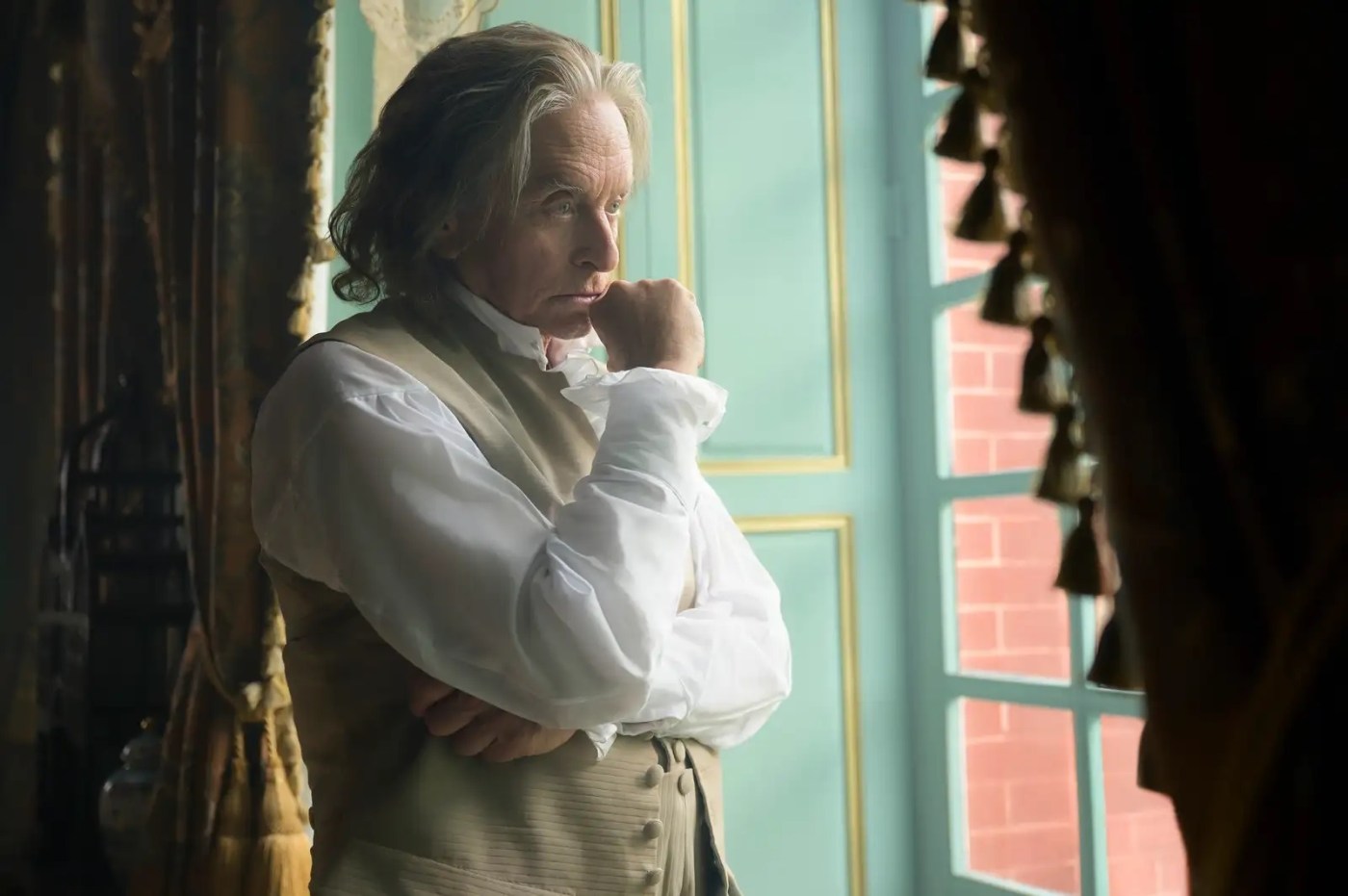
‘Franklin’: What Michael Douglas learned about democracy in new series
Apple TV+’s eight-part series on Benjamin Franklin does a bang-up job of depicting chess-like political maneuvering and landmark bargaining sessions that helped shape the course of history.
But “Franklin” doubly serves as a warning that democratic systems like the one the series namesake helped create are under attack across the globe.
At least that’s how Michael Douglas, who brings decades of acting prowess to the series’ titular role, views it.
Douglas adds another quiver to his impressive acting cap as the nimble-witted, immensely quotable inventor, author, publisher and founding father. “Franklin” hones in on how the publisher of the annual “Poor Richard’s Alamanack” voyaged to France in 1776 where he served as the pivotal dealmaker who shrewdly convinced France to join the Colonies’ fight for independence against the British.
“I think that it really shares with us the fragility of a democracy and just how fragile this concept is, and how it has to be nourished and protected,” said the award-winning actor and producer during an interview to promote “Franklin,” which debuts on Apple TV+ on April 12.
“That becomes clear and evident (during the series) and has echoes of what’s going on in our contemporary times,” Douglas added. “For democracies are endangered species. They are being overrun by autocracies around the world. And I think (democracies are) an extraordinary system. And when you get into a show like this and realize how brilliant this concept was, it’s something that we should be protecting.”
The final episode of this intelligently scripted series from screenwriters Kirk Ellis (“John Adams”) and Howard Korder (“Boardwalk Empire”) particularly coalesces around that theme.
“Franklin” was adapted from the 2005 nonfiction book “The Great Improvisation: Franklin, France, and the Birth of America,” by Pulitzer Prize winner Stacy Schiff. The book covers an oft-overlooked chapter from American history.
Tim Van Patten directed all eight episodes, and the 79-year-old Douglas served as an executive producer along with Schiff and others. Three episodes of the miniseries drop April 12 with one episode following every Friday through May 17.
Douglas admits he was in the dark about the critical role that Franklin played in wooing France to help fund, arm and fight for the fledgling United States’ freedom. Franklin stayed in France for eight years and was joined part of that time by the more stern John Adams (Eddie Marsan), with whom he sparred often, but who also played an instrumental role in making the Treaty of Paris of 1783 happen.
“Unbelievably,” Douglas added, “I was not aware of the most important part, which was after all that Franklin accomplished, at 70 years old, he goes over to France to really save America because we we were in a war with the British and we didn’t have any weapons’ or money or army … nothing. So he went over to this monarchy to try to talk them into it, with all the intrigue and spies. I didn’t know that part and found it really fascinating and ultimately realized that if it weren’t for France we would not have an America.”
While in France, Franklin dodged double agents while receiving a celebrity greeting — due, in part, to his experiments with electricity — and wooed women all around him, as he known to do.
Douglas was joined in this interview by co-star Noah Jupe (“A Quiet Place” and its sequel) who portrays Franklin’s ambitious grandson Temple in the miniseries. He knew zip about Franklin.
“I’m from the U.K.,” the 19-year-old actor explains. “In my high school history class, we didn’t even talk about the American Revolution. So for me, I had a big learning curve in the sense of learning about the entire history of America.”
Temple gets swept up in his grandfather’s mission and while in France served as his secretary. His father was a British loyalist, and estranged from Benjamin Franklin.
Jupe hopes “Franklin” encourages more people into becoming involved in striving for the common good.
“As a society today, I think we’re all very comfortable in our lives and it’s very difficult to change the way things are. I think that this (series) really shows how much work and bravery you have to put in to make things change and to stand for what you believe in and make your country or the world a better place … . That’s important and rare in today’s world.”
Jupe was impressed by Temple’s youth and how he participated in something monumental.
“You’re getting on a ship for 60 days sailing across the sea to a world where everyone speaks a different language (and) everyone is dressing in a different way. Temple’s there for the purpose of America and that’s the priority. But also he’s trying to grow up.”
Douglas grew up as the son of the late Hollywood legend Kirk Douglas. The actor turned heads and won hearts — especially in the Bay Area — as homicide inspector Steve Keller in the hit 1972-77 series “The Streets of San Francisco.” His career caught fire from there. But it was as producer on 1975’s “One Flew Over the Cuckoo’s Nest,” with Jack Nicholson and the late Louise Fletcher, that nabbed him his first of two Oscars — as a producer.
He also took home the best actor Oscar for his unscrupulous moneymaker Gordon Gekko in 1987’s “Wall Street.” Numerous other iconic roles have bookended his long career, which have included him even appearing in Marvel superhero films. In addition to his Oscars, he’s won five Golden Globes, an Emmy and has received the Cecil B. DeMille Award and the AFI Lifetime Achievement Award.
“Franklin” marks a bit of a change for Douglas — an historical period piece. He enjoyed this new direction.
“I think there’s been a big shift to historical pieces,” Douglas said. “I think a lot of it had to do with ‘Bridgerton’ quite honestly.”
To research his role, Douglas dove into Schiff’s biography as well as Walter Isaacson’s 2003 “Benjamin Franklin: An American Life.”
Both Jupe and Douglas appreciate how this story gets told in a series not a stand-alone film.
“It’s accessible all over the world on this platform,” Jupe said.
Douglas sees the length as being beneficial to the intricacies of the material.
“It’s a story to be told in eight hours, not just two hours,” he said, adding he’s proud of the production design and Van Patten’s direction.
“It takes place over eight years and it needs that amount of time,” he said.

